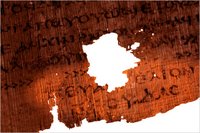
recently, scholars introduced the only extant copy of the gospel of judas. research dates the codex to the 4th century CE, and scholars determine that the original story stems from the first century CE.
the gospel presents a very different portrait of judas iscariot than the four canon gospels. dominant tradition explains that judas betrayed jesus of nazareth to roman soldiers for silver. however, the gospel contends that judas only reveals jesus with his explicit blessing. in fact, jesus shares a secret wisdom that enlightens judas above all of the other apostles. jesus explains, "you will exceed all of them. for you will sacrifice the man that clothes me."
Gnostic Christianity
scholars increasingly identify tremendous diversity within judaism and christianity during late antiquity. early christian groups struggled to gain community authority for their specific interpretation of jesus' life and teachings. recent schoalrship defines three major categories of early christianity: jewish christians, gentile christians, and gnostic christians. the jewish christians, or nazarenes, struggled to understand traditional jewish law inside a new covenant with the jewish god and his messiah, jesus. in contrast, gentile or pauline christians promoted a universal covenant for redemption and salvation through jesus, the son of god.
the gospel of judas is generally attirbuted to gnostic christianity, alternative christian groups that practiced a mystical or spiritual christian theology. mystic belief and practice encouraged a deep, spiritual understanding of logos, the ideal soul of god. gnostic christians specifically believed that jesus was the perfect son of the ideal, unchanging form of goodness and wisdom. further, gnostic christians believed that true redemption and salvation is the enlightened understanding of the deep mysteries of the logos. the gospel of john explains that the mystery of logos, or the mystery of jesus, is "immeasurable light which is pure, holy and immaculate."
Orthodox Christianity
during late antiquity, people read many different religious texts, including multiple variants of single texts. they read these texts similar to the way we read stories, newspapers, or gospels today. however, early church fathers (and early rabbinic sages!) agressively censored and marginalized alternative belief and practice. increasing political authority led to an emergent community practice which then led to the slow development of mainstream tradition.
today, orthodox christianity forcibly rejects the authority of the lost gospel and other apocryphal texts, including the gospel of peter, the gospel of thomas, and the gospel of mary magdala. the corporate church traditionally only recognizes four true gospels: matthew, mark, luke, and john.
however, orthodox christianity (and orthodox judaism) is largely constructed. it promotes a limited, incomplete history of the belief and practice of early christianity. for example, the church establishment only gained significant authority after the conversion of constantine and the roman empire. further, church leadership first established a formal consensus only at the council of nicea in 325, 300 years after the death of jesus. they mandated christian belief "in one god, the father almighty. . . and in one lord jesus christ, the only begotten son of god."
Conclusion
i am not christian. it is certainly not my interest to challenge or dispute the central theology of corporate chrisitianity. i do not mean to say that the 4 central gospels are incorrect, and i do not believe that the lost gospel is the one true word. however, i do want to say that the recent discovery and publication of the gospel of judas further demonstrates that orthodox history of religion is incomplete. we must learn to combine advanced research with progressive faith.
we must be able to reseach and study the letter and spirit of our religious traditions. indeed, maimonides maintained it was essential to study secular philosophy and science. he believed that judaism promoted essential truth. however, he explained that secular study could challenge and advance our understanding of this truth. we can balance critical research and spiritual belief.
we must continue study and scholarship to unfold the true history and authentic meaning of our traditions. recently, peter manseau compared the gospel of judas to an alternative judas presented in "jesus christ superstar". he explains that the two representations of judas are fundamentally different; however, they both challenge and revise the mainstream reading of judas and christianity. he writes, "both faith and history are more complicated than we imagine."


No comments:
Post a Comment